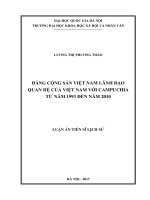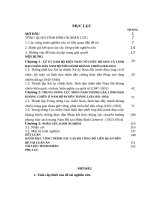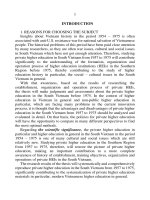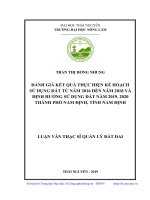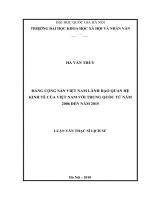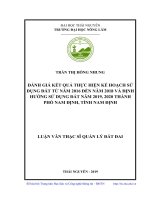Bài tập ôn luyện tiếng Anh lớp 8 cả năm theo Sách global success
Bạn đang xem bản rút gọn của tài liệu. Xem và tải ngay bản đầy đủ của tài liệu tại đây (1.7 MB, 185 trang )
UNIT 1.
LEISURE TIME
A. PHONETICS
I. Put the words into the correct column.
move, June, book, pool, drew, puddings, cartoon, rule, wolf, include, push, do,
threw, would, truth, choose, moon, could, cool, put, root, avenue, pull, wood, fruit,
good, cruise, full, should
/u:/
/ʊ/
II. Choose the word whose underlined port is pronounced differently
from that of the others.
1.
2.
3.
4.
5.
A.
A.
A.
A.
A.
school
club
blue
sugar
afternoon
B.
B.
B.
B.
B.
cook
flu
juice
woman
flood
C.
C.
C.
C.
C.
foot
who
blood
took
soon
D.
D.
D.
D.
D.
look
lose
group
soup
shampoo
B. VOCABULARY
I. Complete the sentences with the words in the box.
into
puzzles
interested
messaging
surfing
keen
connect
fond
1. He’s crazy _____________ photography - he’s got all the gear.
about
DIY
2. Instead of shopping with friends, you can do _____________ together.
3. _____________ the Internet is fun, but it’s also a time waster.
4. My hobby is Chinese chess. Are you _____________ in learning it?
5. Sports _____________ people with similar interests in a collective effort.
6. Anna likes Physics, but she’s not too _____________ on Maths.
7. Text _____________ enables people to keep in close contact at all times.
8. Mr. Henry is _____________ sports, and he works out with a trainer several days a
week.
9. You need a little knowledge and the right tools when you’re doing _____________.
10. Lots of people are _____________ of going fishing or gardening in the
countryside.
II. Write the verbs for the activities.
Activities
1. Doing DIY, cooking
2. Watching TV, reading comic books
3. Playing sports, listening to music
4. Surfing the net, snowboarding
5. Messaging friends, doing puzzles
6. Relaxing, learning something about
Verbs
____________,
____________,
____________,
____________,
____________,
____________,
____________
____________
____________
____________
____________
____________
IT
7. Making paper flowers, knitting
8. Exercising, building dollhouses
9. Taking photos, going for a walk
10. Going cycling, hanging out with
____________,
____________,
____________,
____________,
____________
____________
____________
____________
friends
III. Choose the best answer to complete the sentences.
1. _____________ DIY means you do something yourself without the help of experts.
A. Playing
B. Doing
C. Making
D. Taking
2. She loves making _____________, such as pottery and carving wood.
A. crafts
B. origami
C. stamps
D. bracelets
3. Melinda _____________ hanging out because she is a sociable person.
A. detests
B. hates
C. dislikes
D. fancies
4. Many people like _____________ the Internet with their mobile phones.
A. surfing
B. blogging
C. emailing
D. communicating
5. It’s helpful to learn life _____________ or a foreign language in free time.
A. tricks
B. skills
C. kits
D. tools
6. Video chatting is among dozens of ways to virtually visit friends and
_____________.
A. neighbours
B. acquaintances C. relatives
D. members
7. He doesn’t mind going window _____________ in the mall with his friends.
A. having
B. selling
C. buying
D. shopping
8. Samuel is sociable so he can _____________ a lot of friends at school.
A. make
B. take
C. do
D. work
9. I usually make a phone call to friends instead of _____________.
A. listening
B. messaging
C. reading
D. typing
10. This might sound _____________, but I enjoy watching rain.
A. satisfied
B. weird
C. exciting
D. reasonable
IV. Supply the correct form of the word in the brackets.
1. She isn’t _____________ in growing flowers in the garden. (interest)
2. You need to keep balance in your life with a little leisure and _____________.
(relax)
3. We need one more _____________ for this game - can you persuade your cousin
to join in? (play)
4. The young boy looks _____________ because he often plays basketball on his free
time. (sport)
5. Sue spends her spare time practicing traditional Vietnamese _____________
recipes. (cook)
6. What physical activity do you _____________ perform during leisure time? (usual)
7. Exercise helps you maintain a _____________ weight and prevent chronic
diseases. (health)
8. The campsite offers a wide range of leisure facilities as well as _____________
entertainment. (friend)
9. The resistance of water increases muscle _____________ as you swim. (strong)
10. My mother’s electric _____________ has several temperature settings. (cook)
C. GRAMMAR
I. Fill in the blanks with the -ing form of the verbs from the box.
work
learn
see
do
ride
help
practi
lie
chat
sit
se
1. They spend hours ___________ on the phone to their friends.
2. My brother is interested in ___________ a second foreign language.
3. Mr. Henderson hates ___________ on weekends or holidays.
4. Thank you for signing up to our event and we look forward to ___________ you.
5. It’s noisy outside, but I detest ___________ in my room all day.
6. Jimmy adores ___________ a bike to the countryside and going fishing.
7. He doesn’t mind ___________ me to improve my English speaking skills.
8. Every Sunday morning, my father enjoys ___________ on the beach and relaxing.
9. Do you like going out with us after ___________ your homework?
10. David prefers ___________ judo to hanging out with friends.
II. Choose the correct answer.
1. Don’t (spend/ spending) too much time in front of TV or computer screen.
2. Many people prefer (surfing/ surf) the Internet to reading books.
3. Doing exercise regularly makes your body (become/ to become) healthy and fit.
4. They fancy dancing, but they rarely (going/ go) to a discotheque.
5. Will you be able (stopping/ to stop) checking social media for a month?
6. My uncle doesn’t need (to buy/ buy) modern tools to do the gardening.
7. Let’s go to the beach and (play/ to play) some volleyball games.
8. She enjoys (to make/ making) crafts, especially birthday and greeting cards.
9. I really want (travelling/ to travel) to peaceful places and breathe the fresh air.
10. Would you mind (help/ helping) me with the computer settings?
III. Choose the best answer to complete the sentences.
1. It’s good for you ___________ out and play a sport.
A. to going
B. to go
C. go
D. going
2. My parents never let me ___________ with strangers.
A. hang out
B. hung out
C. hanging out
D. to hang out
3. Mrs. Cohen tried ___________ all the housework before going to bed.
A. finishing
B. finish
C. finishes
D. to finish
4. She adores ___________ ancient coins and foreign banknotes.
A. to collect
B. to collecting
C. collecting
D. collect
5. The cartoon is funny and it makes me ___________ a lot.
A. laughing
B. to laugh
C. laugh
D. laughs
6. He dislikes ___________ disturbed while he is thinking.
A. being
B. is
C. to be
D. be
7. My friend doesn’t mind ___________ me whenever I am in need.
A. to help
B. helping
C. help
D. to helping
8. If you want to pass your exams, you’d better ___________ your attitude towards
studies!
A. to change
B. changing
C. to changing
D. change
9. Susan loves going window shopping and ___________ in the street.
A. walking
B. walks
C. to walk
D. walk
10. Johnson used to stay up late and ___________ video games.
A. plays
B. play
C. playing
D. to play
IV. Choose the underlined part that needs correcting.
1. Please let me to know what you usually do in your leisure time.
A. let
B. to know
C. usually
D. in
2. When the sun is still behind the hill, I adore to cycle in the early mornings.
A. When
B. is
C. adore to cycle D. early morning
3. Daniel is in good shape because he plays sports and do morning exercise
regularly.
A. in good shape B. sports
C. do
D. regularly
4. Michael is interest in pop music, so he will go to the concert this Sunday.
A. interest
B. so
C. will go
D. this
5. My mother enjoys cooking delicious meals for the whole family in weekends.
A. cooking
B. for
C. whole
D. in weekends
6. Kelvin must be addicted on the Net - he holds his phone all the time.
A. must be
B. on
C. holds
D. at the time
7. Watching TV too much can make us to feel tired and have a headache.
A. Watching
B. too much
C. to feel
D. a headache
8. Emily don’t mind working as a volunteer for an environmental organization.
A. don’t
B. working
C. volunteer
D. environmental
9. Don’t be disappointed because you can give up your bad habits and live happy.
A. Don’t
B. disappointed
C. give up
D. happy
10. On my opinion, playing computer games is boring and wastes time.
A. On my opinion B. playing
C. boring
D. wastes
D. SPEAKING
I. Choose the best answer to complete the pair of dialogues.
1. - “Would you like to go to the English club with me?” - “________________”
A. Don’t mention it.
B. You’re welcome.
C. I’d love to. Thanks.
D. I can’t. Thanks.
2. - “Can you help me with this box?” - “________________”
A. No, I don’t have any box.
B. Yes, please keep the box.
C. Yes, you can do anything with the box.
D. I’m sorry, but I’m busy right
now.
3. - “Let’s take a walk together.” - “________________”
A. That’s a good idea.
B. Yes, I can always walk.
C. Thanks for your consideration.
D. Sorry, I don’t want any change now.
4. - “________________” - “That’s great.”
A. Do you fancy going for a swim?
B. Would you mind giving me a hand?
C. Could you teach me how to swim?
D. Can you swim?
5. - “We’re having a party on Saturday. ________________” - “Yes, I’d like to.”
A. Are you interested in it?
B. Would you like to come?
C. What do you like to do?
D. How will you come with us?
II. Put the sentences into the correct order to make a conversation.
___
I learnt it from my cousin. This type of paper folding is called origami.
___
Okay. Let me help you.
___
Are you kidding?
___
Exactly. Origami means the art of paper folding, which is often associated
with Japanese culture. A Japanese friend taught my cousin this art, then she
taught me.
_1_
Wow! Look at this bird. It’s beautiful.
___
Now can you teach me to make this?
___
Yes, I do. The folding lines are very smooth and this paper bird looks quite
real.
___
Where did you learn to fold it?
___
Thank you, Eric. Do you like it?
___
Origami? It sounds like a Japanese word.
___
No, I’m not. I really want to learn. I’ll fold something and give it to my sister
as a present.
E. READING
I. Read the passage and choose the best answer.
The most interesting hobby that I have is playing the guitar. I have played guitar
for three and a half years now and I am getting better at it every time I decide to
play. Playing guitar keeps me doing something interesting at home instead of
staring at the ceiling all the time. Actually, it is a very relaxing activity. It gives
person some time to think and dream.
Guitar or guitars also give my room some personality. When it hangs on my wall it
seems like a piece of art. I have two guitars - one is black acoustic one and the
second is a yellow Spanish guitar. The last one was my first guitar and both of
them are Yamaha products. I bought the classical one because it was required to
learn guitar in my school. Since I am interested in blues, jazz and rock music I felt
that I needed a change in my guitar play and that is why I bought the black
acoustic one.
I can play many different songs and after 3 years of experience I have learned
how to learn the songs to play them. My favorite songs that I have learned are
Led Zeppelin’s Stairway to Heaven and Leonard Cohen’s Hallelujah. I can also play
a bit Sting, Nirvana, Metallica and the Animals.
In the future I want to improve my guitar playing skills and maybe use them in
some small band or I would just like to play with my friends. I would certainly
recommend learning guitar. If interest in it comes, it cannot be put away.
1. The first paragraph is mainly about ______________.
A. why playing the guitar is the author’s most interesting hobby
B. the author’s good feelings about playing the guitar
C. how the author chose to play the guitar and the benefits of playing it
D. the author’s hobby of playing the guitar and some of its benefits
2. According to the second paragraph, the author’s first guitar is ______________.
A. not a Spanish one
B. black
C. not an acoustic one
D. not a classical one
3. Why did the author buy the acoustic guitar?
A. Because the author likes to play blues, jazz and rock music.
B. Because the author was required to learn guitar in school.
C. Because the other guitar can’t play classical music.
D. Because the author wanted to change his current one.
4. What does the phrase “the Animals” in the third paragraph possibly refer to?
A. a song
C. some kinds of animals
B. a music band
D. none of above
5. We learn from the passage that ______________.
A. the author plays the guitar because he usually does nothing in his free time
B. the author has totally four guitars
C. the author can play different songs of different types of music
D. the author will continue to play the guitar in the future
II. Fill in each blank with a word from the box.
practice
hands
professio
carving
others
arts
both
enjoyed
nal
Arts and crafts describes a wide variety of activities involving making things with
one’s own (1) ______________. Arts and crafts is usually a hobby. Some crafts, or art
skills, have been practised for centuries, (2) ______________ are more recent
inventions. A quote by Apoorva Rathore: Art cannot be taught, it comes from
thinking. But it can be improved by (3) ______________.
(4) ______________ children and adults enjoy arts and crafts. Children in schools
may learn skills such as woodworking, wood (5) ______________, sewing, or making
things with all sorts of material. Many community centres and schools have
evening or day classes and workshops where one can learn (6) ______________ and
craft skills.
Although “crafts” today are usually hobbies (7) ______________ by amateurs, the
word was used many centuries ago by (8) ______________ people who had a guild
system. Young people were learned from a master-craftsman, i.e. they were
“apprenticed”, and they often took many years to learn their skills to perfection.
F. WRITING
I. Write complete sentences using the prompts given.
1. Elizabeth/ enjoy/ listen to/ Vietnamese folk songs’ melodies
___________________________________________________________________________________
2. He/ need/ buy/ some tools/ fix/ dog house/ this weekend
___________________________________________________________________________________
3. Play/ online games/ have/ both/ positive/ negative effects
___________________________________________________________________________________
4. Calvin/ like/ read/ books,/ and/ he/ not/ often/ surf/ Internet
___________________________________________________________________________________
5. Why/ not you/ turn off/ TV/ go out/ some fresh air?
___________________________________________________________________________________
6. Hobbies/ such as/ play/ sports/ or/ do/ exercise/ be/ good
___________________________________________________________________________________
7. I/ not/ mind/ do/ homework,/ but/I / not/ like/ have/ lots of it
___________________________________________________________________________________
8. Make/ crafts/ help/ me/ improve/ my patience/ carefulness
___________________________________________________________________________________
II. Complete the second sentence so that it means the same as the first
one.
1. I find collecting birthday cards interesting.
I’m interested in
2. She likes socializing with friends more than watching TV.
She prefers socializing
3. If you don’t study hard, you won’t pass the mid-term test.
Unless you
4. Please help me with this exercise!
Would you mind
5. If you get too attached to your smartphone, you won’t have time for your
family.
Don’t get
6. Going fishing in the rural areas is really enjoyable.
I really enjoy
7. He was kind of addicted to the Net, but now he isn’t.
He used to
8. Why don’t we take a break and relax for a while?
Let’s
UNIT 2.
LIFE IN THE
COUNTRYSIDE
A. PHONETICS
I. Put the words into the correct column.
mother, pick, hospitable, village, picturesque, collect, busy, cottage, water, sing,
open, sofa, milk, gather, calendar, hill, around, fish, message, famous, decide,
accident, return, suppose, farmer, pretty, symbol, build, today
/ə/
/ɪ/
II. Choose the word whose underlined port is pronounced differently
from that of the others.
1.
2.
3.
4.
5.
A.
A.
A.
A.
A.
activity
begin
sky
chicken
ago
B.
B.
B.
B.
B.
ship
possible
shy
excellent
pasta
C.
C.
C.
C.
C.
dinner
sit
mystery
open
banana
D.
D.
D.
D.
D.
kitchen
harvest
why
problem
shortage
B. VOCABULARY
I. Complete the sentences with the words in the box.
hospitable
canals
paddy field
orchards
cultivate
herding
load
surrounded
well-trained
combine
harvester
1. Villagers in the northeast regions ______________ mostly rice and corn.
2. ______________ and rivers form the waterways of the Mekong Delta.
3. He sometimes goes ______________ the buffalos over several kilometres from
home.
4. Most countryside houses are ______________ by green trees and rice fields.
5. In my province, people often ______________ rice onto boats and transport it on
rivers.
6. Water buffalos are still used to pull the ploughs through the muddy and flooded
______________.
7. Vinh Long is a beautiful farm province, with grapefruit and orange
______________ everywhere.
8. Farmers in my homeland are ______________, opening to sharing, and welcoming
on their farm.
9. The modern ______________ is a machine designed to harvest a variety of grain
crops.
10. Rides on ______________ horses are an incredible experience in their beautiful
countryside.
II. Fill in the blanks with the verbs in the box.
grow
stretc
ploug
fly
unloa
feed
dry
milk
catch
h
h
d
1. There isn’t enough wind to ______________ a kite, so let’s walk home.
harve
st
2. Our family ______________ the cabbage and turnips from our field.
3. Their fields ______________ about 5 km, or 3 miles, north to south.
4. I helped her ______________ to the cows, to feed the chickens, and to plant
carrots.
5. It is important to ______________ rice grain as soon as possible after harvesting.
6. Her farm aims to grow enough barley to ______________ the pigs in all seasons.
7. The farmers ______________ their fertile fields with oxen in the traditional way.
8. If we don’t ______________ the grain soon, it will start rotting in the silos.
9. Do you want to know how to ______________ fruit trees in your own garden?
10. You can ______________ fish with a hook in a small pond near my house.
III. Choose the best answer to complete the sentences.
1. Do you like to have a farm tour and try your hand at milking ______________?
A. cows
B. fish
C. pigs
D. dogs
2. After harvesting rice, the farmers often ______________ it in the sunlight.
A. collect
B. water
C. dry
D. plant
3. The farmers were ______________ because they warmly welcomed us and
accommodated our needs.
A. hospitable
B. healthy
C. interesting
D. well-trained
4. Ploughing the ______________ with buffalos is a common cultivation method in
the highlands.
A. crops
B. lakes
C. ponds
D. fields
5. It was so fun when we came to the point of herding the ______________.
A. fruit
B. trees
C. cattle
D. poultry
6. This national park is a ______________ and tranquil place to go and visit.
A. crowded
B. peaceful
C. noisy
D. busy
7. As a main source of food, paddy rice is ______________ in about 123 countries.
A. picking
B. growing
C. loading
D. herding
8. The farm has a ______________ expanse of grassland for us to play football.
A. vast
B. short
C. limited
D. narrow
9. My cousin rode the bike ______________ through the narrow soil paths.
A. clearly
B. skillfully
C. exactly
D. hardly
10. They got about 30 million tons of grain at the end of the ______________
season.
A. planting
B. watering
C. ploughing
D. harvesting
IV. Supply the correct form of the word in the brackets.
1. Have you ever taken a train to discover Britain’s ______________ countryside?
(picture)
2. ______________ in the countryside north of Ha Noi still continue the tradition of
water puppet shows. (village)
3. The river flows ______________ in rural countryside between green fields. (quiet)
4. Raising animals was only secondary to other forms of ______________. (farm)
5. There’s nothing like the ______________ of the countryside, the quiet and the
lack of distraction. (peaceful)
6. People living in rural areas are likely to have unique ______________ care needs.
(support)
7. The ______________ of Viet Nam comes from every aspect of life through photos,
texts, poems, etc. (beautiful)
8. The ______________ stopped work, sat down and started to eat and drink.
(harvest)
9. Some thought him ______________ because he disliked meeting people.
(sociable)
10. The cost of ______________ is much higher in cities than in the country. (live)
C. GRAMMAR
I. Choose the correct answer to complete the sentences.
1. Horses, mountain bikes and feet work _____________ on grasslands. (good/ well)
2. Agriculture is still based on _____________ methods in some countries.
(traditional/ traditionally)
3. The _____________ populated provinces present a different economic picture.
(dense/ densely)
4. He is very _____________ he often buys things for other people. (generous/
generously)
5. The village is _____________ situated in a quiet spot near the river. (beautiful/
beautifully)
6. Our house is very central, so we can _____________ get to theatres and cinemas.
(easy/ easily)
7. They have replanted many areas with rare and _____________ plants. (unusual/
unusually)
8. She _____________ ran down the stairs to greet her cousins. (excited/ excitedly)
9. The Thompsons left their homeland and looked for a _____________ place to stay.
(permanent/ permanently)
10. Some reporters spoke _____________ about rural development. (optimistic/
optimistically)
II. Supply the comparative form of the words in brackets. Add “than”
where necessary.
1. Average incomes in rural areas are rising _____________ those in the city. (slow)
2. The conditions they’re living in are _____________ we thought. (bad)
3. Your book looks _____________ mine. Can I borrow it for some days? (interesting)
4. The evening in the countryside is often _____________ that in the city. (peaceful)
5. Many families in the suburbs are _____________ the ones you meet in the urban.
(happy)
6. With the help of technology we can live _____________ ever before. (convenient)
7. Watching football is one of Britain’s top leisure activities, even _____________
eating out. (popular)
8. Henderson said that he could run _____________ anybody else in the class. (fast)
9. This year’s harvest season seems to come a week _____________ usual. (early)
10. All these students are good, but some work _____________ others. (hard)
III. Choose the best answer to complete the sentences.
1. This year’s exam was much _____________ than last year’s.
A. the harder
B. harder
C. more hardly
D. more hard
2. The growth rate of rice farms is _____________ that of corn farms this year.
A. higher more than
B. high more than
C. more higher than
D.
higher
than
3. I think living in the city is _____________ living in the countryside.
A. more expensive than
B. expensive more than
C. as expensive more than
D. more than expensive
4. Our house in the town looks _____________ than their house in the country.
A. moderner
B. more moderner
C. more modern D. modern
5. The development of cities happens _____________ than that of the countryside.
A. more rapidly
B. much rapidly
C. more rapid
D. more rapidly as
6. We could go back to the days when life was _____________ it is today.
A. slower than
B. slowlier than
C. slower
D. more slowly
7. I think you’ll find going fishing _____________ than playing mobile games.
A. more relaxing much
B. much more relaxing
C. more much relaxing
D. much relaxing more
8. My parents’ farm is very big, but my uncle’s is even _____________.
A. more bigger
B. more big
C. bigger than
D. bigger
9. Doing the shopping in the countryside is _____________ that in cities.
A. the least convenient
B. less conveniently than
C. less convenient than
D. least conveniently
10. Adding fertilizer to the soil will help the plants to grow _____________.
A. more quick
B. quicklier
C. more quickly
D. quickly more
IV. Choose the underlined part that needs correcting.
1. He feels more happily there than in a crowded and noisy city.
A. more happily
B. there
C. in
D. crowded and noisy
2. When spring comes, we enjoy to pick flowers on the hill near our house.
A. spring comes B. to pick
C. on
D. near
3. The farmers in my region usually don’t grow crops and flowers together.
A. in
B. usually don’t grow
C. and
D. together
4. It’s not always true that living in the city is better than live in the countryside.
A. It’s
B. always true
C. the city
D. live
5. We helped them load the rice onto buffalo-drawn carts and transport them
home.
A. load
B. onto
C. buffalo-drawn carts D. them
6. Will you help me putting up a tent when our school go camping next month?
A. Will
B. putting
C. when
D. camping
7. Their village had no running water, so they collected water to the stream.
A. had no
B. so
C. collected
D. to
8. Kelvin was very kind and he acted more responsible than anyone in the class.
A. was
B. kind
C. responsible
D. anyone
9. I lived happily in the farm and there was still more much to explore.
A. lived
B. happily
C. was
D. more much
10. Which activity do you like most, herding a buffalo or riding a horse?
A. Which
B. most
C. herding
D. riding
D. SPEAKING
I. Match the sentences.
1.
How
was
your
stay
in
countryside?
2. Look at the clear blue sky.
3. What did you do during
vacation?
4. The apricot tree is in full bloom.
the a. Yes, they are.
b. Their harvest time is in December.
your c. Why don’t you like it?
d. It was pleasant during the day but a
little boring at night.
5. Are people in the countryside more e. And its blossoms look lovely in the
optimistic than those in the city?
6. Country life doesn’t excite me at all.
sun.
f. So villagers can now use electrical
appliances.
7. When is their harvest time?
g. I’m glad that you like it.
8. Rice is now transported home on h. What a beautiful sky it is today!
trucks.
9. The village has electricity now.
10. What a beautiful kite you have!
Answer:
i. Yes, but it used to be put on animaldrawn carts in the past.
j. Lots of things.
123456789II. Complete the conversation with the sentences from the box.
10-
Where did you spend it?
And I took many photos, but they're not here now.
It's peaceful and quiet, isn't it?
My uncle's farm isn't too big but it has many things I like.
Do you want to join me next time?
What did you do there?
I promise I'll invite you when I get there again.
Which activity do you like most?
Lucas:
Hi,
Minh.
How
was
your
vacation?
(1)
______________________________________
Minh:
Hi, Lucas. It was great. I went to my uncle’s farm in the Mekong Delta
to pay a visit.
Lucas:
(2) ______________________________________
Minh:
A lot of things. My cousins and I enjoyed going fishing, herding cattle,
flying a kite, picking fruit...
Lucas:
Sounds great! (3) ______________________________________
Minh:
Well, it’s hard to say. Each activity gave me a different feeling. But I
like the surroundings and environment there.
Lucas:
(4) ______________________________________
Minh:
Yes, it is. It’s not so noisy and busy as in the city. Fresh air and vast
green
fields
make
me
feel
very
relaxed.
(5)
______________________________________
Lucas:
What are the things you like about your uncle’s farm?
Minh:
Paddy field, fish pond, and fruit orchard... What beautiful scenery! (6)
____________________
Lucas:
Wow! I wish I could see it with my own eyes.
Minh:
Oh, you can totally do that. (7) ______________________________________
Lucas:
Yes, I do. I really want to visit some place like your uncle’s farm.
Minh:
(8) ______________________________________. It may be after this school
year.
Lucas:
Thank you very much. You’re so kind.
Minh:
Don’t mention it.
E. READING
I. Read the passage and decide whether the statements are TRUE (T) or
FALSE (F).
When I was young, I used to spend the summer on my grandparents’ farm. I loved
those days, so carefree and enjoyable. There were so many things to do and to
sec that I was never bored. I would get up at sunrise and go for a walk around a
meadow. I had a dog and together we wandered while the rest of the world was
sleeping.
In the morning my grandmother fed the chickens and other farm animals and my
grandfather turned out the cattle. Then together we went to a field to reap the
harvest. We usually worked in the field until lunchtime but when it was too hot to
work I picked currants, raspberries or fruit in the garden or went for a walk to a
nearby forest and looked for birds’ nests. Later in the afternoon I would often go
swimming or fishing in the river. When I felt lazy, I just lay in the sun and watched
the birds and animals again and collect chickens’ eggs. I even learned to milk the
cows and I was very proud of myself. My grandparents had a barn behind the
house, and I used to spend the night there. I took my sleeping-bag and a torch
and slept in hay. That was an unforgettable experience. After such holidays I
always returned to town refreshed and healthy.
Now I do not spend the summer in the country any longer. My grandparents have
grown old and they are not strong enough to work in the fields and look after
cows, pigs and hens. I visited them last year but it was not the same. The village
has grown and developed. You can no longer see horses in the fields but modern
agricultural machines. The forest I loved so much has been cut and has lost its
natural beauty.
I miss the good old days and I feel sorry that time goes by so quickly.
____
1. The author lives in a town and his grandparents live in the country.
____
2. The author enjoyed the activities on his grandparents’ farm.
____
3. In his grandparents’ place, the author used to get up late in the morning.
____
4. The author usually looked for birds after picking fruits in the garden.
____
5. There’s a barn behind the grandparents’ house and the author used to sleep
there.____
6. The author never went swimming in the river, but fishing.
____
7. At current time, the grandparents have grown old, so they do not work in the
field. ____
8. Horses and agricultural machines can be found in the fields now.
____
II. Choose the best answer to fill in the blanks.
Today, people all over the world are moving out of small villages in the country to
go and live in big, noisy cities. They are moving from the peaceful mountains,
fields and rivers of the countryside to the busy world of streets, buildings, traffic
and (1) ______________. This movement from rural areas to urban areas has been
going on for over two hundred years.
In many countries, the main reason why people come to live in towns and cities is
work. After one or two large factories have been built in a town, people come to
find work and a better (2) _____________, and soon an industrial area begins to
grow. There is usually a residential area nearby where the factory workers can
live. The families of these workers need schools, shops and hospitals, (3)
______________ more people come to live in the area to provide these services and so a city grows.
A lot of people live in the (4) ______________ of the city, far away from the
industrial area and the city centre. Some suburbs are pleasant, with nice houses
and parks for children to play, but others are poor, with old houses and bad
conditions.
But what is the future of the big cities? Will they continue to get bigger and
bigger? Perhaps yes. Some major cities have actually become bigger in the last
ten years and it is quite possible that one day we will see people (5) ______________
of the countryside and go to bigger towns and cities.
1.
2.
3.
4.
5.
A.
A.
A.
A.
A.
crowded
living
but
urban
moving out
B.
B.
B.
B.
B.
overcrowded
life
or
city centre
coming
C.
C.
C.
C.
C.
crowding
live
so
downtown
moving in
D.
D.
D.
D.
D.
crowds
alive
and
suburbs
leaving
F. WRITING
I. Write complete comparative sentences with the cues given.
1. His farm/ big/ other farms/ neighbourhood
___________________________________________________________________________________
2. Today/ he/ behave/ less/ responsibly/ he/ used to
___________________________________________________________________________________
3. The traffic/ in/ city/ be/ always bad/ the morning
___________________________________________________________________________________
4. My homework/ be/ all right,/ but/I/ could do/ well/ that
___________________________________________________________________________________
5. people/ live/ healthily/ rural areas/ in/ cities?
___________________________________________________________________________________
6. Yesterday/ Thomas/ arrive/ at school/ early/ other students
___________________________________________________________________________________
7. I/ can/ fly a kite/ easily/ in/ farm/ many other places
___________________________________________________________________________________
8. Our village/ be/ much/ less/ densely populated/ your city
___________________________________________________________________________________
II. Complete the second sentence so that it means the same as the first
one.
1. A horse doesn’t plough as well as a buffalo.
A buffalo
2. The paddy field is so vast and green.
How
3. No flowers on the hill are as colourful as this one.
This is
4. The front yard has three orange trees.
There are
5. It was such a beautiful flower farm that lots of tourists came to enjoy it.
The flower farm
6. Brian is better at herding the cattle than William.
William is not
7. City people talk less optimistically about the future than people in rural areas.
People in rural areas
8. It’s raining heavily, but he continues collecting rice on the farm.
Despite

